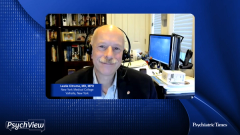
Daridorexant Trials for Insomnia Treatment
Experts discuss daridorexant efficacy and safety data, and dosing considerations and what to communicate with patients when using daridorexant for insomnia.
Episodes in this series

Paul Doghramji, MD, FAAFP: Let’s go into daridorexant a little more deeply, and let’s take in the data from the phase 3 trials. Can you get into some of those? Starting with the randomized, double-blind, placebo-controlled international trials of patients 18 and older, can you start there?
Leslie Citrome, MD, MPH: Sure, there were 2 studies. One is called Study 1 on the product label, and it looked at doses of daridorexant at 50 or 25 mg vs placebo, and that included close to 1000 people. That is supported by Study 2, which looked at a lower dose of 25 mg and included a 10 mg dose arm as well compared to placebo, also in close to 1000 people. The bottom line is that 50 mg appears to be the best dose in terms of the effect in helping patients fall asleep faster and stay asleep longer, as well as scores on the IDSIQ [Insomnia Daytime Symptoms and Impacts Questionnaire] sleepiness domain. The 25 mg a night dose still works, numerically it also shows improvements over placebo, but did not separate from placebo statistically on the IDSIQ sleepiness domain score the next day. So putting all the data into perspective here, and if I had to choose a starting dose, I would select 50 mg. However, 25 mg is available, and there may be instances where that may be preferred by the patient under certain circumstances.
Paul Doghramji, MD, FAAFP: So there’s a 25 and 50 mg dose, but there’s no mandate to start with the 25 mg and titrate upward, is that correct?
Leslie Citrome, MD, MPH: That’s correct. You can start at 50 mg, you can start at 25 mg, you can give 25 mg and then 50 mg, you can give 50 mg and then give 25 mg. You can do whatever you like with those 2 doses. I look at the clinical trial data, and I ask myself where is the effect size the most robust, and where would I increase my chances of success? It would be with the 50-mg dose.
Paul Doghramji, MD, FAAFP: Now you’ve already said that the 25 and 50 mg both increase the latency to persistent sleep, how long it took patients to get to sleep. It also improved wake after sleep onset, they both did. They both also increased the total sleep time, and you’ve also said that with the IDSIQ score, the next day effects were only improved by the 50 mg. Does that make us want to consider the 50 mg more, and to prescribe that more often because it was the one compared to 25 mg that improved the daytime sleepiness?
Leslie Citrome, MD, MPH: I would think so. Some of these measures [such as] the latency to persistent sleep, LPS, and wake after sleep onset, or WASO, they’re polysomnography measures. It may be difficult to wrap our heads around it. I do pay a lot of attention to subjective measures because that’s what I would expect patients to report to me in treatment. So subjective total sleep time is really important. We saw that improvement after 1 week in the clinical trials, and it continues to improve over time, so I pay special attention to that. With the idea of the IDSIQ sleepiness domain score showing a statistically significant degree of improvement over placebo at the 50-mg dose, but not statistically significant at the 25-mg dose, it tells me I probably will be better off with 50 mg. But although it was not statistically significantly different for the 25-mg dose, it was still numerically better, so I wouldn’t completely dismiss the 25 mg dose. There may be instances where a patient may be skittish about trying a new medicine and worried about dosing. They may tell you, “I’m very sensitive to medicine, doctor, and I really don’t want to take too much of it.” The last thing you want is for them to have a complaint when you force a dose they’re not comfortable with. So in those circumstances I would think about a 25-mg dose, but I would also say that the clinical studies tell us that 50 mg is a better dose.
Paul Doghramji, MD, FAAFP: You’ve already said that some of these data that came out were at month 1 and month 3, but I’m aware that the clinical studies showed also weekly increments about how things went with patients over a 3-month period. It seemed like when you looked at the total sleep time and at the IDSIQ that it seemed to build over time. That means that as the patient took the medication, it seemed to do better. Maybe you’re reaching maximum effect at around 5, 6, or 7 weeks. Does this translate into telling our patients that when they take this medication, “Start taking the medicine, but don’t judge it let’s say after the first week or two. Give it longer than that because it seems from the clinical trials that the benefits of it seem to improve over time,” at least when we look at the total sleep time and at the IDSIQ. Is that fair to say?
Leslie Citrome, MD, MPH: I’d be a little cautious there because you would expect something like this to start to work right away. A phase 2 clinical trial was done, and it demonstrates that daridorexant does work right away. But the first time point that was measured in the phase 3 clinical trial program for the polysomnography measures was at the end of the first month. And the first time point where subjective total sleep time was assessed was at the end of the first week. But I would expect something like a DORA [dual orexin receptor antagonist] to work right away. I’m glad to see that there is continued improvement over time as someone persists in taking it. That’s good. That’ll be self-reinforcing for the patient to continue that medicine.
I tell patients it should work, it should work pretty quickly, but you do have to give it about a week or so before making any judgment here. I say this particularly for patients who are used to taking other medicines like Z-drugs or benzodiazepine, when they’re used to being knocked out with a sledgehammer. This does not do that, but it does help patients fall asleep faster and stay asleep longer, and that’s definitely true. That’s seen in polysomnography as well as in subjective measures. Patients need to be told it works differently and it will feel different to them. They won’t get that same kind of sensation that they may have gotten with a benzodiazepine, but it’ll still work with their sleep.
Paul Doghramji, MD, FAAFP: This medication as you said earlier has the shortest half-life of all the DORAs; I think you said it was 8 hours or so. Does that translate into next morning residual effects?
Leslie Citrome, MD, MPH: If you look at the rate of adverse events, of somnolence or sedation, they are low, and they are comparable to what was observed with placebo, so I wouldn’t expect it to be an obstacle to its use.
Paul Doghramji, MD, FAAFP: Are there any safety data and maybe even dose discontinuation data with daridorexant?
Leslie Citrome, MD, MPH: I tell patients that with the DORAs including daridorexant, you can stop it at any time, and there is no rebound insomnia as they may have experienced in the past when they tried to stop their zolpidem abruptly, for example, and it was a disaster for them. They may be very leery about a new sleeping medicine. They may be worried about being physically dependent on it, hooked on it. They don’t want to experience that again. So I have encountered that from time to time in patients who are no longer on a sleeping medicine, and somehow they did manage to wean off it, and they’re very hesitant to start again with something that they worry may be difficult to stop. I can tell them it can be stopped abruptly. There were no withdrawal symptoms, there was no rebound insomnia, and the effects don’t wear off as you continue taking this medicine like it did the last time they were on a hypnotic.
I do run into some patients, and this is quite common in clinical practice, who are continuing to take something like zolpidem every night, and they’ve been taking it for 10 years, and every time they tried to stop it they’d run into problems. They’re not sleeping well. The medicine no longer works for them. I want to offer them a DORA, and I’ll give them the DORA, and then I’ll proceed to wean them off the other hypnotic very slowly, over many weeks. That way I ensure a better experience. If I too abruptly discontinue their prior medicine that they have been taking every night for years, they might experience rebound insomnia. Then they tell me, “This new medicine you gave me doesn’t work at all.” In fact, it’s not the new medicine; it’s the withdrawal effects from their old medicine.
Paul Doghramji, MD, FAAFP: So, one way of going from a present sleeping medication to another is to have an overlap period with a discontinuation gradually of the first medication.
Transcript edited for clarity
Newsletter
Receive trusted psychiatric news, expert analysis, and clinical insights — subscribe today to support your practice and your patients.










